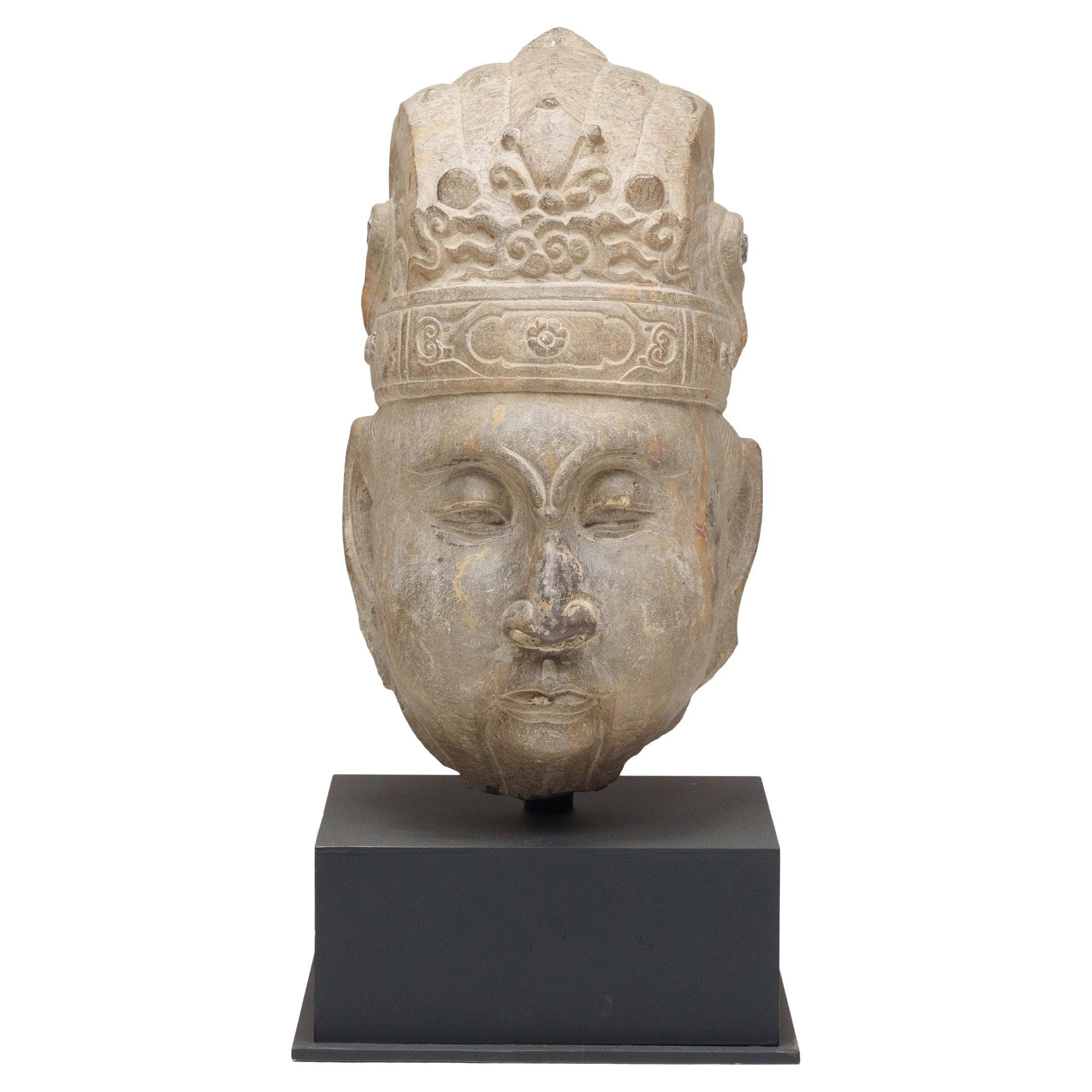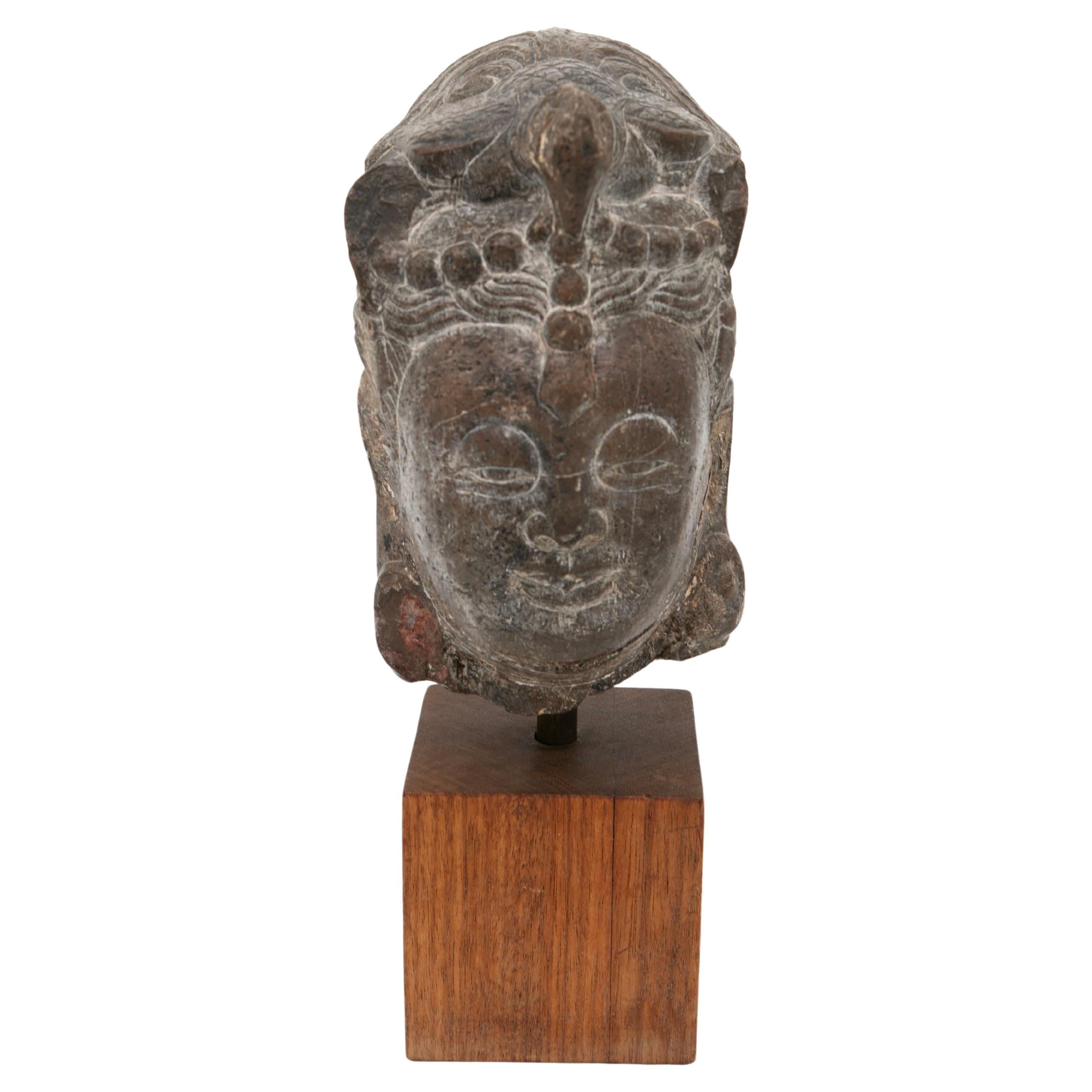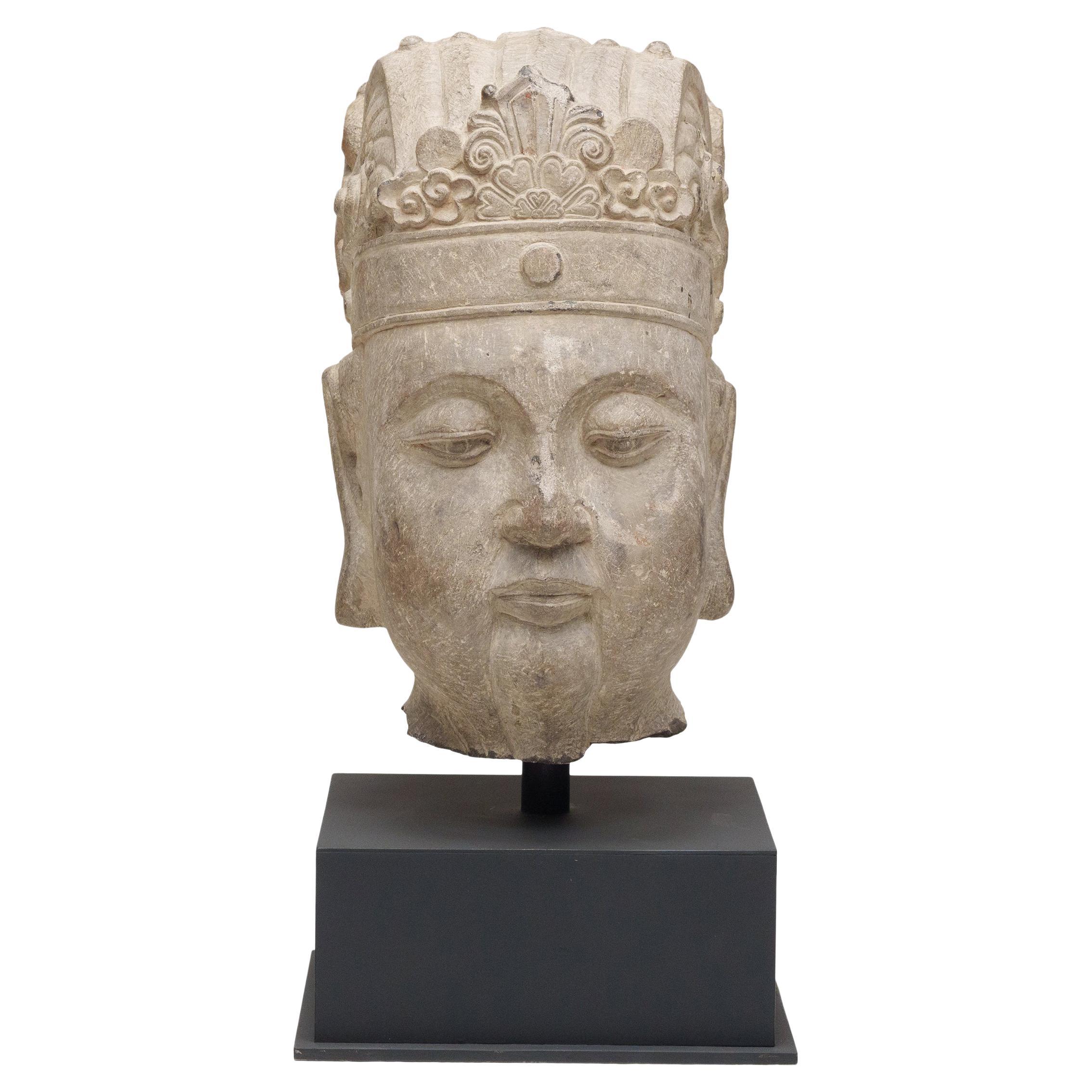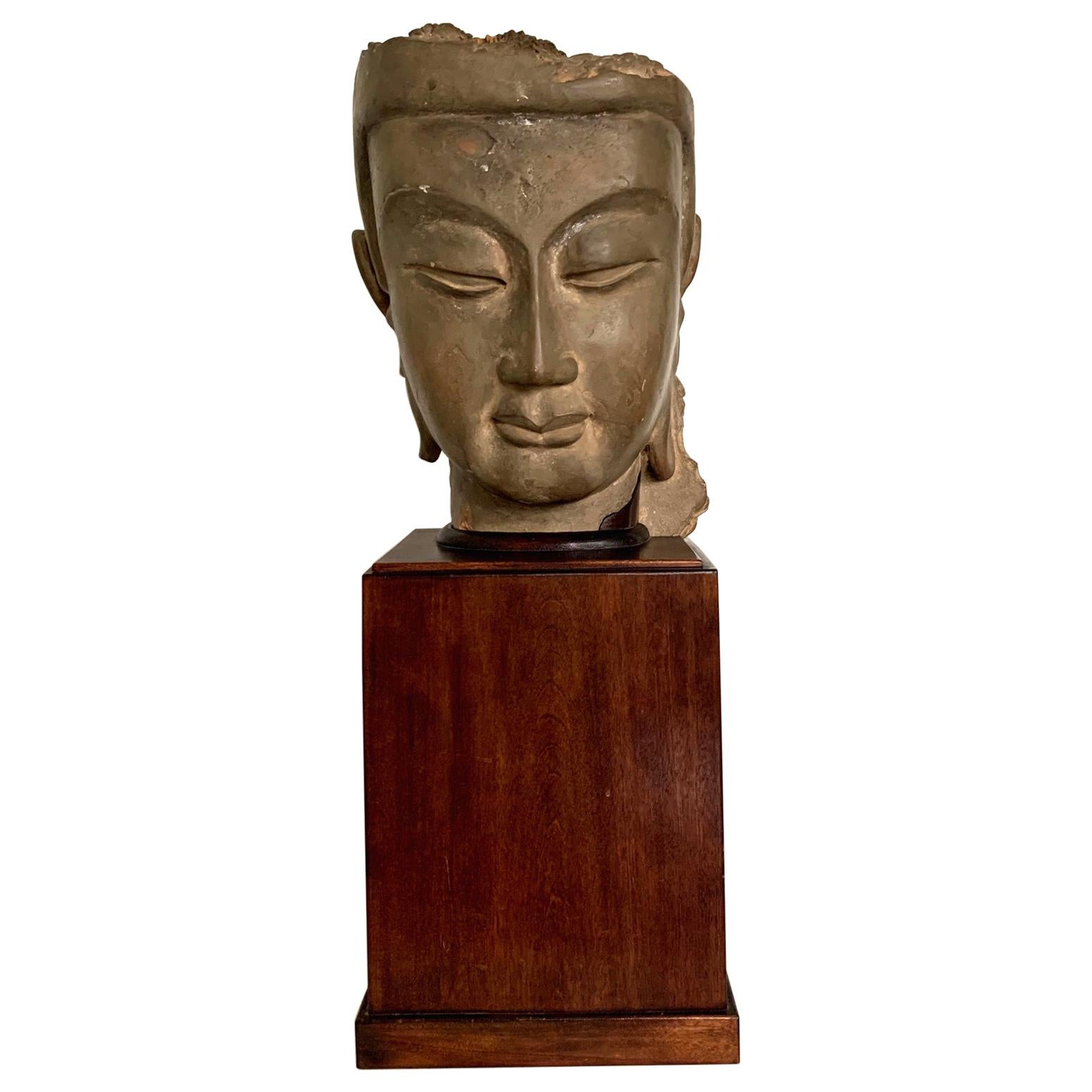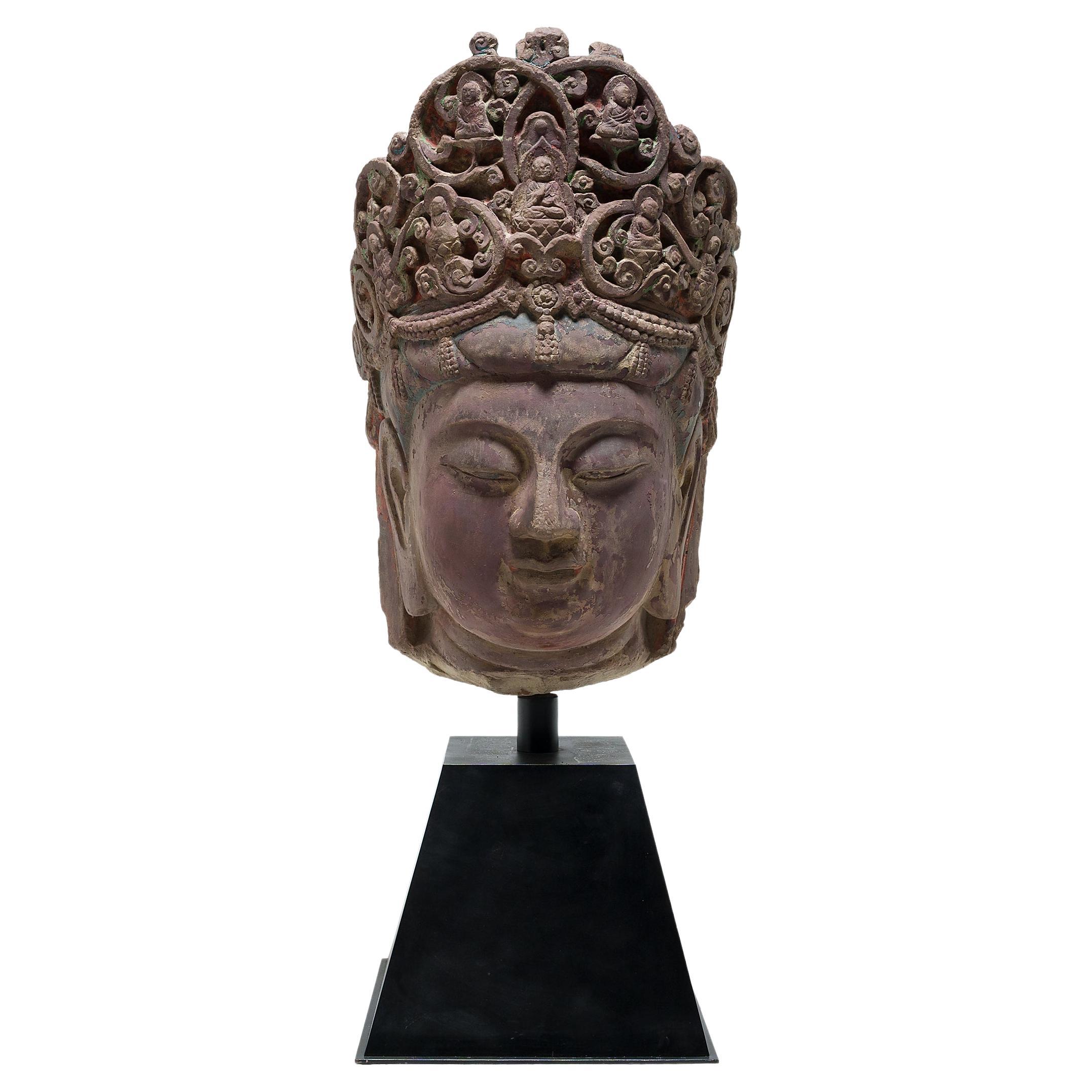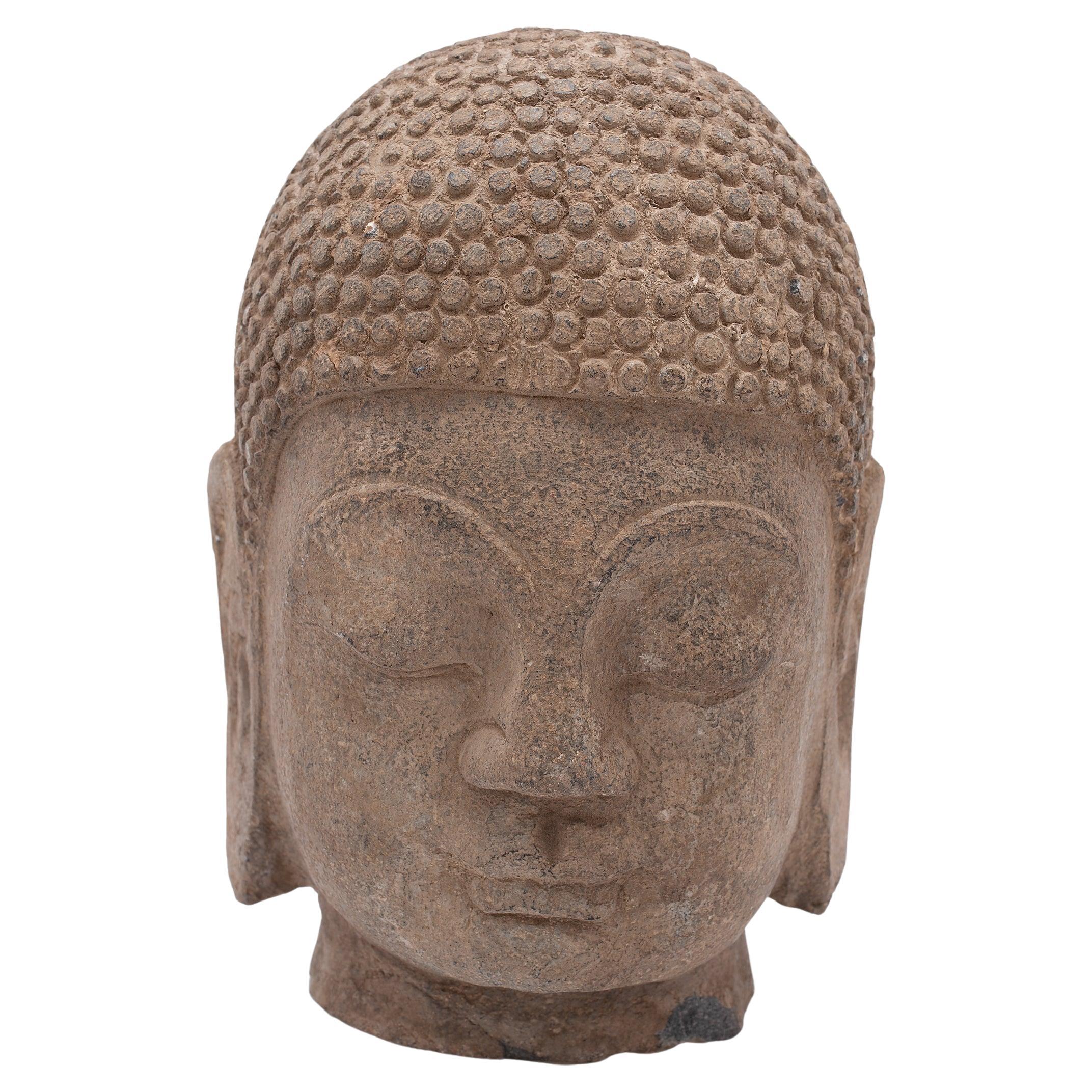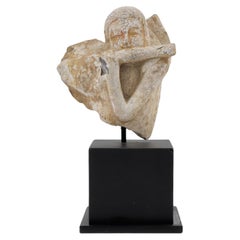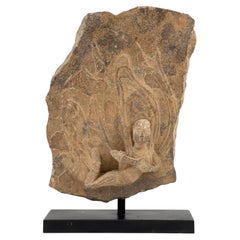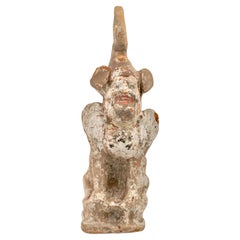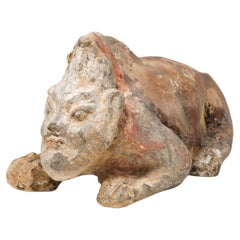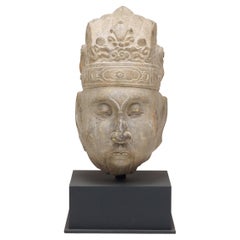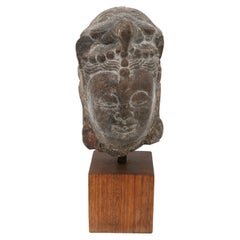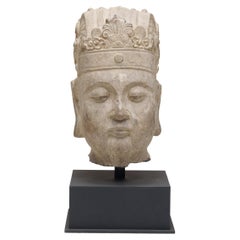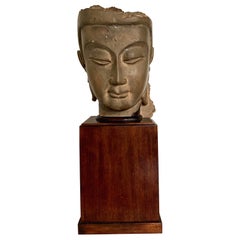Items Similar to Stone Head of Bodhisattva, Northern Wei-Tang Dynasties
Want more images or videos?
Request additional images or videos from the seller
1 of 11
Stone Head of Bodhisattva, Northern Wei-Tang Dynasties
$5,196
$12,99060% Off
£3,945.45
£9,863.6160% Off
€4,511.91
€11,279.7860% Off
CA$7,259.57
CA$18,148.9160% Off
A$8,074.22
A$20,185.5560% Off
CHF 4,216.11
CHF 10,540.2760% Off
MX$98,254.69
MX$245,636.7260% Off
NOK 53,846.13
NOK 134,615.3260% Off
SEK 50,498.17
SEK 126,245.4260% Off
DKK 33,674.13
DKK 84,185.3260% Off
Shipping
Retrieving quote...The 1stDibs Promise:
Authenticity Guarantee,
Money-Back Guarantee,
24-Hour Cancellation
About the Item
The face with downcast eyes and a smile, the hair swept up behind the pendulous ears into a high topknot. Faint traces of pigmentation hinting at the sculpture's original polychromy. The black stand was made in Hong Kong at the time of the acquisition.
Date : Northern Wei-Tang Dynasty(5-8th century)
Provenance : Acquired in late 1990s from Hongkong
Reference :
1) Sotheby's London 13 May 2015 - The Soul Of Japanese Aesthetics – The Tsuneichi Inoue Collection - Lot 18
(Price realised : 17,500 GBP / Type : Closely related)
2) Sotheby's New York 26 September 2023 - CHINA / 5000 YEARS - Lot 1156
(Price realised : 8,890 USD / Type : Closely related)
* Stone Head of Bodhisattva (Northern Wei-Tang dynasty)
The Stone Head of a Bodhisattva from the Northern Wei to Tang Dynasty is a notable example of Buddhist art produced during this transformative period in Chinese history. This era, spanning from the late 4th to the early 10th century, was characterized by significant religious and artistic developments.
During the Northern Wei Dynasty (386–534 AD), Buddhism became a major influence in Chinese culture, prompting the creation of numerous Buddhist statues and sculptures. The art from this period is noted for its stylized, elongated figures and serene facial expressions, influenced by the Gandhara style of Buddhist art from present-day Pakistan and Afghanistan. This style reflects a deep spiritual idealism, aiming to represent the enlightened state of the Bodhisattvas.
As the period transitioned into the Tang Dynasty (618–907 AD), the art took on more Chinese characteristics, moving away from the Indian-influenced Gandharan style. Tang Dynasty Buddhist sculptures are renowned for their robust, lifelike qualities and rich detailing. The facial features became fuller and more realistic, and the garments and poses reflected greater naturalism and fluidity.
A typical stone head of a Bodhisattva from this era would likely showcase a serene expression with half-closed eyes symbolizing meditation and spiritual introspection. The head might also feature a ushnisha, a protuberance on the top symbolizing supreme wisdom, and might be adorned with detailed carvings of jewelry and elaborate hairstyles, reflecting the high status of Bodhisattvas in Buddhist theology.
Such artifacts are not only valuable for their beauty and craftsmanship but also provide insight into the religious and cultural shifts within China during these centuries. These sculptures are considered spiritual representations designed to aid in meditation and devotion, serving as a bridge between the human and the divine.
- Dimensions:Height: 4.14 in (10.5 cm)Diameter: 2.76 in (7 cm)
- Style:Tang (Of the Period)
- Materials and Techniques:
- Place of Origin:
- Period:
- Date of Manufacture:5-8th century
- Condition:Minor fading.
- Seller Location:seoul, KR
- Reference Number:1stDibs: LU9577239847762
About the Seller
4.8
Gold Seller
Premium sellers maintaining a 4.3+ rating and 24-hour response times
Established in 1999
1stDibs seller since 2023
38 sales on 1stDibs
Typical response time: <1 hour
- ShippingRetrieving quote...Shipping from: seoul, Korea South
- Return Policy
Authenticity Guarantee
In the unlikely event there’s an issue with an item’s authenticity, contact us within 1 year for a full refund. DetailsMoney-Back Guarantee
If your item is not as described, is damaged in transit, or does not arrive, contact us within 7 days for a full refund. Details24-Hour Cancellation
You have a 24-hour grace period in which to reconsider your purchase, with no questions asked.Vetted Professional Sellers
Our world-class sellers must adhere to strict standards for service and quality, maintaining the integrity of our listings.Price-Match Guarantee
If you find that a seller listed the same item for a lower price elsewhere, we’ll match it.Trusted Global Delivery
Our best-in-class carrier network provides specialized shipping options worldwide, including custom delivery.More From This Seller
View AllCelestial being(Apsara) Stone Statue, Northern Wei-Tang Dynasty
Located in seoul, KR
This statue appears to be a stone sculpture of an apsara, a celestial nymph from Buddhist and Hindu traditions. Despite its fragmentary state, the sculpture conveys grace and movement. The apsara is captured in a dynamic pose, perhaps once part of a larger tableau, playing a flute-like instrument. The facial features are serene yet expressive, with faint traces of pigmentation hinting at the sculpture's original polychromy. The black stand was made in Hong Kong at the time of the acquisition.
Date : Northern Wei...
Category
Antique 15th Century and Earlier Hong Kong Tang Antiquities
Materials
Stone, Limestone
$4,450 Sale Price
50% Off
Apsara Carved Limestone Stele with Extremely Rare 'Oolitic silica', Wei Dynasty
Located in seoul, KR
The small dots apparent on the surface of this stone stele are indicative of an oolitic silica structure or oolites formed in what is known as "Oolitic chert." The same phenomenon can also be observed in the Tang Dynasty Limestone Stele at the Asian Art Museum in San Francisco. This formation occurs gradually over the course of thousands to several hundred thousand years within the soil or sea. Similar structures are commonly found in ancient fossils or arrowheads. Ancient peoples chose certain types of stones for tool-making, preferring materials that were easier to work with and could be sharpened effectively. This predilection is believed to be the reason why oolitic silica structures are frequently found in ancient arrowheads.
The development of these oolitic silica structures is a very slow process involving the accumulation of siliceous layers around particulates. This phenomenon, where silica reacts with water to form layers around a nucleus, occurs under specific chemical and physical conditions. Typically, it takes thousands to hundreds of thousands of years for silica to gradually accumulate in layers through contact with moisture, a process that requires a precise harmony of many variables, including chemical conditions, temperature, pressure, pH, and biological activity.
It is known that no other stele with such a silica structure has been identified to date, serving not only as evidence of its authenticity but also significantly enhancing the rarity of this piece.
This stele appears to be a stone sculpture of an apsara, a celestial nymph from Buddhist and Hindu traditions. Despite its fragmentary state, the sculpture conveys grace and movement. The apsara is captured in a dynamic pose, perhaps once part of a larger tableau, playing a flute-like instrument.
The black stand was made in Hong Kong at the time of the acquisition.
Date : Northern Wei/Eastern Wei Dynasty(386~550)
Size : 22cm (Height) x 16cm(diameter)
Condition : Good (oolites dots on surface)
Provenance : Acquired in late 1990s from Hongkong
Reference :
1) Sotheby's New York 20 March 2018 - Jingyatang Treasures Of Chinese Buddhist...
Category
Antique 15th Century and Earlier Hong Kong Han Antiquities
Materials
Stone, Limestone
$14,950 Sale Price
50% Off
Guardian Official Pottery Figure, Northern Wei-Tang Dynasty
Located in seoul, KR
This figure appears to be a terracotta statuette, possibly representing a court official or a deity given the distinct headgear which could signify a rank or divine attribute. The style of the figurine, with its facial features and remnants of paint, suggests it could be a part of funerary art, which was common in Chinese culture during these periods.
Date : Northern Wei...
Category
Antique 15th Century and Earlier Hong Kong Tang Antiquities
Materials
Earthenware, Pottery
$1,895 Sale Price
50% Off
Guardian(Half human half beast) Pottery Figure, Northern Wei-Tang Dynasty
Located in seoul, KR
This guardian figure represents a fusion of human and beast, a common motif symbolizing protection in Chinese lore. Crafted from pottery, the figure is a testament to the era's sculp...
Category
Antique 15th Century and Earlier Hong Kong Han Antiquities
Materials
Pottery
$1,950 Sale Price
50% Off
Heavenly Beings Carved Limestone Stele Fragment, Northern/Eastern Wei Dynasty
Located in seoul, KR
Flying two heavenly beings depicted in the stone. They are celestial beings called an Apsara. While having the same fragment and shape, another work I uploaded exhibits small dots on...
Category
Antique 15th Century and Earlier Hong Kong Han Antiquities
Materials
Limestone
$6,435 Sale Price
35% Off
Large Pottery Standing Figure of Attendant, Han dynasty
Located in seoul, KR
This artwork, acquired in Hong Kong during the 1990s, is presumed to have been produced in the same kiln from the Han dynasty, based on the head of the Sotheby's reference piece, which also originated from Hong Kong. Furthermore, given its almost identical shape to the piece from the Artemis Gallery...
Category
Antique 15th Century and Earlier Hong Kong Han Antiquities
Materials
Pottery
$3,213 Sale Price
30% Off
You May Also Like
Tranquil Chinese Stone Bodhisattva Head
Located in Chicago, IL
Exuding an energy of calm and tranquility, this larger-than-life stone bust depicts a Buddhist bodhisattva in serene meditation. A disciple of the Buddha, a bodhisattva is a compassi...
Category
20th Century Chinese Qing Figurative Sculptures
Materials
Limestone
Chinese Song Dynasty Buddha Stone Head
Located in Kastrup, DK
Stone Buddha head with beautiful, natural, age-related patina from the Chinese Song Dynasty,
The head, measuring 18 x 12 x 12 cm, is mounted on a wooden ...
Category
Antique 15th Century and Earlier Chinese Other Figurative Sculptures
Materials
Stone
Tranquil Chinese Stone Bodhisattva Head
Located in Chicago, IL
Exuding an energy of calm and tranquility, this larger-than-life stone bust depicts a Buddhist bodhisattva in serene meditation. A disciple of the Buddha, a bodhisattva is a compassi...
Category
20th Century Chinese Qing Statues
Materials
Limestone
Fine Chinese Stucco Head of Bodhisattva Southern Dynasties
Located in Atlanta, GA
On offer is a fine Bodhisattva head made of stucco around a wood core circa 6th century AD. The fragment was part of high-relief wall sculpture based ...
Category
Antique 15th Century and Earlier Chinese Archaistic Sculptures and Carvings
Materials
Earthenware, Stucco, Petrified Wood
Monumental Chinese Stone Guanyin Head, c. 1800
Located in Chicago, IL
As the embodiment of compassion, Guanyin is the most beloved enlightened being in China. Known as the Goddess of Mercy, she is the female bodhisattva form taken by Avalokitesvara in eastern Buddhism and is instantly available to all who call upon her with their mind. Though commonly depicted as a woman in Chinese statuary...
Category
Antique Early 19th Century Chinese Qing Sculptures and Carvings
Materials
Stone
Chinese Stone Shakyamuni Buddha Head
Located in Chicago, IL
With closed eyes and a gentle expression, this large stone Buddha head brings calm and serenity to its surroundings. The hand-carved figure depicts the historic Buddha Shakyamuni, also known as Shaka, Gautama Buddha...
Category
20th Century Chinese Qing Sculptures and Carvings
Materials
Stone
More Ways To Browse
Stone Head
Buddhist Art
Asian Heads
Antique Stone Head
8th Century
Stone Artifacts
Stone Carving Head
Antique Indian Head
Dynasty Jewelry
Antique Buddhist Statues
Asian Stone Head
Limestone Head
Japanese Stone Carving
Bodhisattva Chinese
Chinese Stone Statue
Indian Statues
Antique Black Limestone
Indian Head Sculpture
